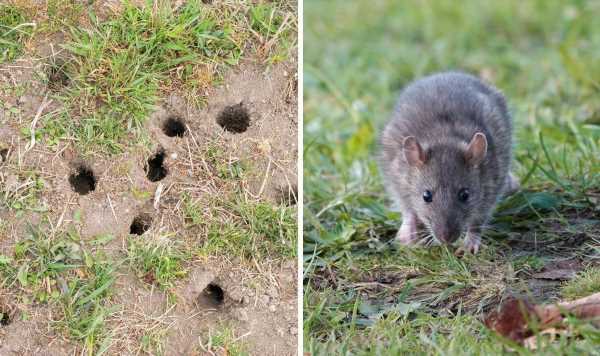This Morning: Alice Beer shares tips for removing pests
We use your sign-up to provide content in ways you’ve consented to and to improve our understanding of you. This may include adverts from us and 3rd parties based on our understanding. You can unsubscribe at any time. More info
According to Checkatrade, rats are pests and can carry diseases such as Leptospirosis, which can lead to Weil’s disease. The animals are often found under decking, in greenhouses, in sheds as well as behind structures like compost heaps. As they’re nocturnal, Britons are unlikely to see them around during the day, which is why it is important to look out for the signs you have a rat in your garden.
Checkatrade experts said: “The most common signs of an infestation are…tunnels and runs which are found along walls and fences. They’re around 10cm wide.”
Gnawed wood and teeth marks on items is also a sign there are rats about as well as any teeth marks on any vegetables.
Luckily, there are various different ways to keep rats away using natural methods.
The experts explained: “We’re often asked ‘how do I keep rats out of my garden?’, and the answer is, prevention is always better than cure.
“No one enjoys calling in an exterminator to deal with the issue. So, if you’re looking for how to get rid of rats in the garden humanely or avoid having to altogether, then follow these tips.”
Firstly, gardeners should keep on top of garden maintenance so the rats have fewer places to hide.
Also making sure decking is airtight will help to stop rats resting as well as making sure compost bins are secured with chicken wire.
For those with rats near vegetables, it is important to keep all different types of animals and insects away.
DON’T MISS:
‘Avoid’ using tap water with ‘sensitive’ peace lilies [EXPERT]
Homes Under the Hammer buyer replaces bathroom for £35 [VIDEO]
How to remove ‘toughest’ clothing stains including nail polish [COMMENT]
According to the experts, peppermint oil can be used to “deter rats” from setting up camp.
It can be used around the vegetables to help keep the pests away.
Lemon, citronella and eucalyptus oil can also be used wherever traces of the rodent are spotted.
The experts added: “Catnip is a natural rat deterrent, so grow a few of these minty plants to stop them moving in.
“Cover or remove water sources too. If you have a pond, try to raise and cover it.”
Gardeners can also build a raised bed with soil netting to give plants a chance, as well as securing strong and secure polytunnels.
Checkatrade continued: “The best way to fill rat holes in your garden is with cement, soil, dirt or gravel. Mesh or chicken wire also work, as does wire wool.
“Try to plug the holes at night when the rats won’t be home. This lets them find a new home instead of perishing in the hole.”
Ant infestations are also common this time of year and can be hard to get rid of.
According to experts at www.hillarys.co.uk, it’s all about smells and disrupting the ant’s ability to pick up on scent trails left behind by other ants.
They recommended using lemons, cinnamon as well as chalk, which they said is the “easiest way” to keep ants out of the home.
The experts said: “Chalk contains calcium carbonate and this confuses the scent that the ants are following.
“Drawing lines of chalk around an entrance should keep ants from coming inside.
“It isn’t totally clear why they simply won’t cross the line, but it does work.
“Be sure to avoid insecticide chalks though as these will kill the ants.”
Source: Read Full Article



